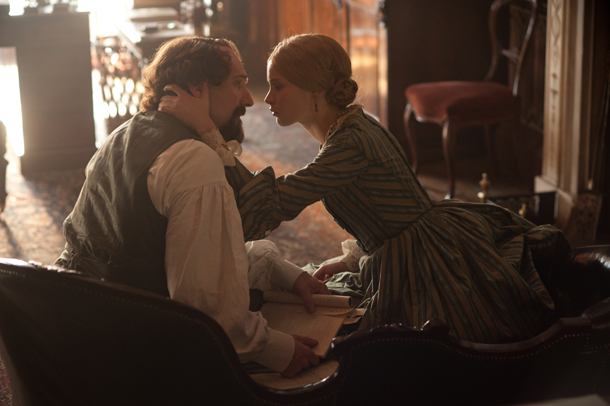
London Film Festival Review: The Invisible Woman (2013)
Cast: Felicity Jones, Ralph Fiennes, Michelle Fairley
Director: Ralph Fiennes
Country: UK
Genre: Biography | Drama | Romance
Editor’s Notes: The following review is part of our coverage of the BFI London Film Festival. For more information on the festival visit http://www.bfi.org.uk/lff and follow the event on Twitter at @bfi.
Having tackled one literary legend in his directorial debut Coriolanus, Ralph Fiennes takes on the equally renowned novelist Charles Dickens in his adaptation of Claire Tomalin’s book of the same name. Once again balancing the difficult responsibilities behind and in front of the camera, he portrays Dickens himself in The Invisible Woman in an exploration of the character’s relatively unknown affair with Nelly Ternan (Felicity Jones). Lavished with extravagant set pieces and highly detailed period attire, The Invisible Woman makes up for in appearance and tone what it sorely lacks in story and depth.
Fiennes brings a charmingly alluring level of charisma to the enigmatic character of Dickens, portraying him as a light-hearted and jovial soul enjoying the pinnacle of his literary success. Opposite the celebrated actor is the up-and-coming Felicity Jones in a role sure to propel her career towards the big-time; her poised and controlled manner brings a level of depth to Ellen Ternan that fails to be supplemented by the script.
 Fiennes brings a charmingly alluring level of charisma to the enigmatic character of Dickens, portraying him as a light-hearted and jovial soul enjoying the pinnacle of his literary success. Opposite the celebrated actor is the up-and-coming Felicity Jones in a role sure to propel her career towards the big-time; her poised and controlled manner brings a level of depth to Ellen Ternan that fails to be supplemented by the script. Jones is severely limited in what she can achieve with such a poorly written character; Ternan is depicted onscreen as uptight, sullen and stoic towards Dickens. The poorly developed emotional arc that the character undergoes contributes to the incoherent impression that The Invisible Woman seeps, but is by no means the fault of the actress; the character is placed in a one-size box, unable to grow.
Fiennes brings a charmingly alluring level of charisma to the enigmatic character of Dickens, portraying him as a light-hearted and jovial soul enjoying the pinnacle of his literary success. Opposite the celebrated actor is the up-and-coming Felicity Jones in a role sure to propel her career towards the big-time; her poised and controlled manner brings a level of depth to Ellen Ternan that fails to be supplemented by the script. Jones is severely limited in what she can achieve with such a poorly written character; Ternan is depicted onscreen as uptight, sullen and stoic towards Dickens. The poorly developed emotional arc that the character undergoes contributes to the incoherent impression that The Invisible Woman seeps, but is by no means the fault of the actress; the character is placed in a one-size box, unable to grow.
The relationship between Dickens and Ternan is hardly plausible; the artistic direction of the film places huge emphasis of Dickens’ fame and works, abandoning the narrative backbone of the film: the affair. Eventually, when the their blossoming relationship is explored, it feels rushed and crass; very little care has been taken to carefully and meticulously trace the steps of what Fiennes attempts to depict the be all and end all of true love. He makes the sore mistake of flying off on too many tangents, forgetting the truth of the story and unintentionally awarding The Invisible Woman with a bizarre and disjointed narrative structure – the film has no beginning, middle or end. Events simply transpire without a properly established premise to support them.
Fiennes’ and Jone’s clear lack of onscreen chemistry further reduces the gloopy viscosity of the film’s movement from plot point to plot point; the sluggish pace of The Invisible Woman brands it gratingly dull and difficult to focus on.
Fiennes’ and Jone’s clear lack of onscreen chemistry further reduces the gloopy viscosity of the film’s movement from plot point to plot point; the sluggish pace of The Invisible Woman brands it gratingly dull and difficult to focus on. The tedium of the long, drawn out scenes that appear to have little relevance to the plot is frequently unbearable, along with the rash editing that, once again, awards the film with a rushed and hurried ambience despite its slothful pace. The editing is annoyingly unpredictable, crassly cutting from scene to scene, occasionally when such adjacent acts have no relation to one another. To further add to the confusion, the film regularly jumps from past to present; the gaping gaps left by such liberty are never filled with the requisite answers. Owing to this patchy and dotted timeline, The Invisible Woman is immensely unfulfilling to watch.
Despite the film’s good intentions, The Invisible Woman is ultimately an ill-judged, self-indulgent mess of a film that vacillates between embodying a core biopic element, to romantic dramaticism and finally, a well-documented midlife crisis trope of an older gentleman falling for a young and enchanting ingénue that can only end in discontent. Even its undeniably impressive production values can’t save a sloppily put together and half-heartedly directed film that will ultimately be assigned to the forgettable channels of daytime television.
Related Posts
Zoe De Pasquale
Latest posts by Zoe De Pasquale (see all)





























